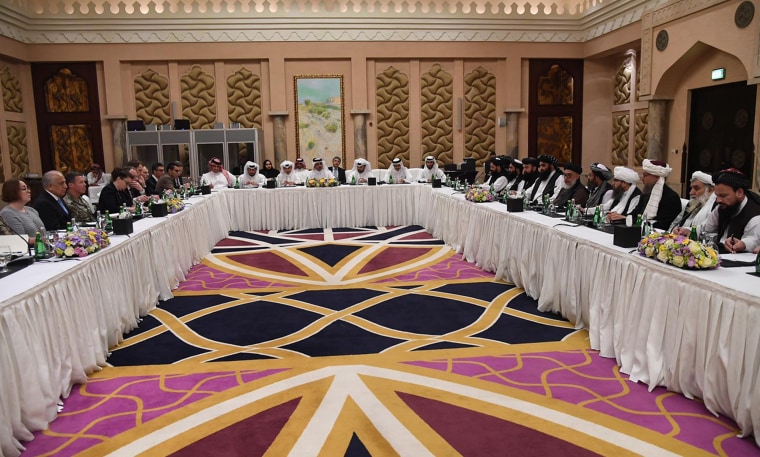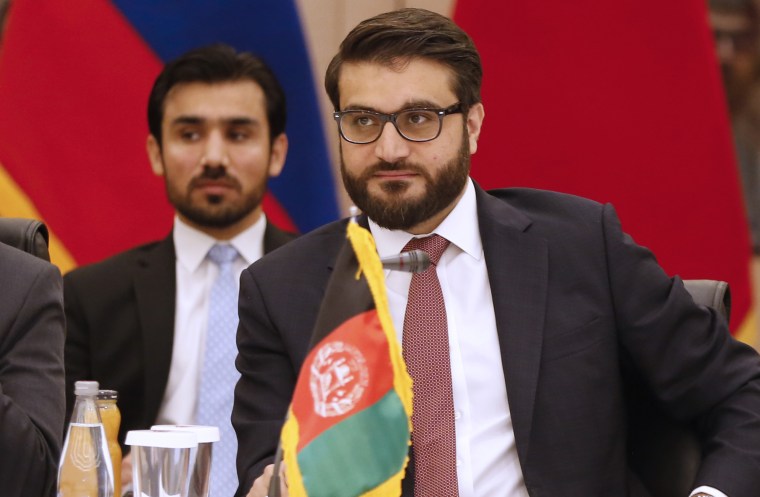A top Afghan government official on Thursday blasted the Trump administration's peace talks with the Taliban, accusing a U.S. presidential envoy of shutting out the Kabul government and betraying the trust of a close ally.
"We don't know what's going on. We don't have the kind of transparency that we should have," Hamdullah Mohib, Afghan national security adviser, told reporters during a visit to Washington.
Asked if President Donald Trump's envoy for reconciliation in Afghanistan, Zalmay Khalilzad, was consulting the Afghan government on his talks with the Taliban insurgents, Mohib said: "No. We get bits and pieces of information."
He added: "The last people to find out are us."
The commanders of Afghan security forces were deeply concerned about the situation, Mohib said.
"How am I supposed to convince them that they are not being sold out?"
The Afghan government was asked to send a negotiating team to recent talks in the United Arab Emirates to take part in possible three-way proximity talks among the Taliban, the United States and Kabul representatives, he said. But the Afghan representatives were reduced to waiting in hotel lobbies and were not properly briefed by the U.S. delegation, according to Mohib, who served as Afghan ambassador to the United States until he returned to Kabul last year.
"It was a humiliation for the Afghan government," he said.
His extraordinary criticism revealed a bitter divide between the two countries at a moment when the Trump administration is pushing hard to broker an end to the 17-year-old war and allow for the withdrawal of American troops. U.S. lawmakers from both parties and some former U.S. diplomats have warned against a hasty negotiation with the Taliban that could amount to an American capitulation.
Afghan President Ashraf Ghani previously has spoken of the risks of moving too hastily to cut a deal with the Taliban and warned Washington not to sideline his government in the talks. But his national security adviser's broadside went a step further, accusing Washington of selling out Afghanistan and questioning the motives of Trump's Afghan-born envoy.
"We think there may be personal ambitions, because there is a lack of information," Mohib said.
Khalilzad has been considered a possible presidential candidate in Afghanistan in the past, and has held discussions with opposition Afghan political figures in Kabul, he said.
"The perception in Afghanistan, people in the government think that perhaps, perhaps all this talk is to create a caretaker government of which he will then become the viceroy," Mohib said.

A State Department official, who was not authorized to speak on the record, dismissed the allegations.
"Mr. Mohib's comments are inaccurate and unhelpful, and we will be responding to them privately today," the official said. His comments do not in any way reflect the high level of U.S.-Afghan coordination on all matters involving peace in Afghanistan. "It is vital that the Afghans take this opportunity for peace."
At a State Department press briefing, spokesman Robert Palladino said that Mohib's comments did not warrant a public response.
But he said the U.S. remains in close consultation with President Ashraf Ghani and other senior officials, that Khalilzad has paid frequent visits to Kabul to hold discussions with Afghan leaders and that the U.S. ambassador to Afghanistan and his team are in contact with Ghani on "a near daily basis."
"There is no lack of coordination," Palladino said.
He later offered an account of a meeting on Thursday afternoon between David Hale, undersecretary of state for political affairs, and Mohib.
Hale reminded Mohib that Khalilzad represents the secretary of state, and “that attacks on Ambassador Khalilzad are attacks on the Department and only serve to hinder the bilateral relationship and the peace process,” Palladino said in a statement.
A White House National Security Council official rejected Mohib's comments and said the United States values its longstanding relationship with Afghanistan.
"We are fighting shoulder-to-shoulder with Afghan security forces to stabilize the country and defeat terrorist threats, and at the same time we are working together toward bringing an end to the war," the official said in an email.
"We recognize that for any peace settlement to be sustainable, the Taliban must engage with the Afghan government and other Afghan stakeholders to establish a political road map for Afghanistan's future."
Given that Khalilzad enjoys the full backing of the administration in his role as envoy, Mohib's harsh criticism could end up only complicating the Afghan government's relations with Washington, said one former senior U.S. diplomat, Laurel Miller.
"These remarks imply a dangerous misreading of the political and policy environment in Washington. No one here doubts that Khalilzad is an empowered negotiator representing US interests. Important to find a way to swim with the tide not against it," Miller said in a tweet.
Khalilzad and other U.S. officials have said repeatedly that the administration has consulted with the Afghan government throughout the discussions with the Taliban and is seeking to create the conditions for direct talks between the Afghan government and the Taliban.
But sources familiar with the talks say Khalilzad's team has pushed Ghani to engage more with opposition leaders to forge a broader team for peace negotiations, and believe the Afghan president has grown isolated politically.
On Tuesday, Khalilzad wrapped up another round of talks with the Taliban in Doha, saying they had clinched a draft agreement on two key issues — the withdrawal of U.S. troops and the insurgency's commitment to break ties with Al-Qaeda or other terrorist groups.
"It's clear all sides want to end the war. Despite ups and downs, we kept things on track and made real strides," Khalilzad tweeted.
He also said that "nothing is agreed until everything is agreed."
Trump has made clear he would like to withdraw U.S. troops from Afghanistan, and his desire to end the American military presence has led to a diplomatic full-court press to end the war.
But Mohib said the Afghan government was skeptical of public statements from the United States or Pakistan that the talks had produced progress.
"We like to hear that progress is made. But what is it?" Mohib said. "Our understanding is if there is a deal, it's a bad deal."
Taliban leaders have long refused to hold face-to-face negotiations with the Afghan government, which they portray as a puppet of the United States. They have also insisted that the U.S. must first agree to pull out its troops before any other issues can be settled.
The number of U.S. troops in Afghanistan fluctuates but the Pentagon says about 14,000 are currently on the ground, advising Afghan forces and carrying out counter-terrorism operations against Al-Qaeda or Islamic State fighters.
Mohib said if the U.S. wants to withdraw its troops, the administration could discuss this directly with the Afghanistan government, under the terms of a bilateral agreement between the two countries.
By holding extended talks with the Taliban, Washington was undercutting its ally while lending credibility to an adversary that had claimed the lives of thousands of Americans and Afghans, he said.
"We are told that Ambassador Khalilzad is a great diplomat and he knows what he's doing. I'm not sure I buy that. He is ostracizing, alienating a very trusted ally and partner," he said.
Although Khalilzad is officially the U.S. envoy for "reconciliation," Mohib said: "He is not reconciling. He is alienating."
